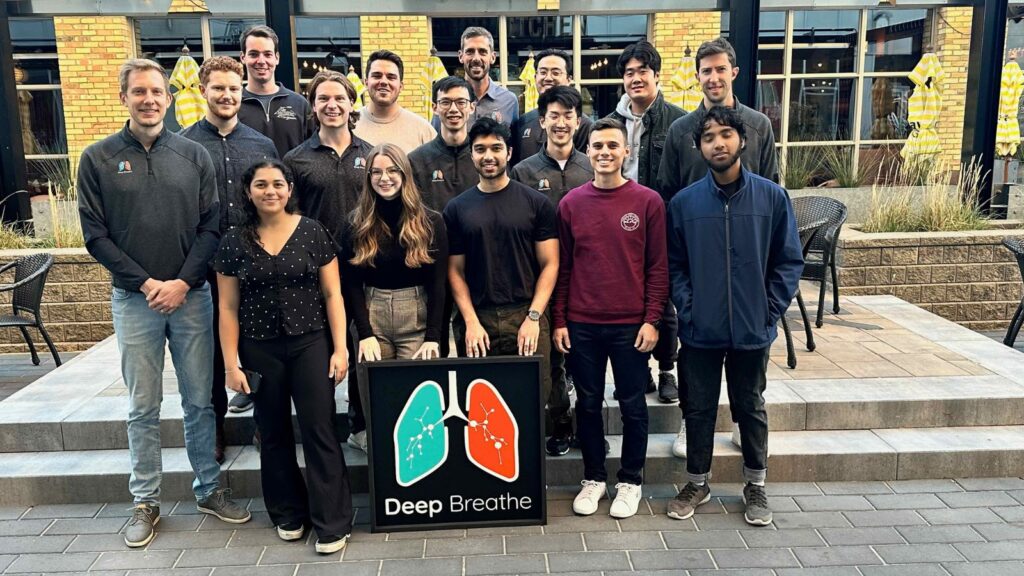London, ON has a deep history of contributing to the MedTech space in Canada. From some groundbreaking innovations including the discovery of insulin by Frederick Banting and early trials for HIV vaccines to housing prominent research facilities, hospitals and globally recognized educational institutions, the Forest City prides itself in a rich medical background. Making exceptional contributions to this sector in the critical care ultrasound space, Dr. Rob Arntfield is now revolutionizing lung health diagnostics through an AI-powered portable lung imaging software at Deep Breathe.
Determined to empower healthcare providers to perform accurate lung assessments, Deep Breathe leverages AI and lung ultrasound technology to ‘bring the equipment’ to the patient rather than relying on traditional stationary X-ray machines for lung health diagnosis. The idea of portable lung imaging software came to Dr. Arntfield during his long and successful career as a professor, clinical care physician and ultrasound expert. “I have had a chance to train doctors all over Canada and North America and I would witness them using stationary X-ray machines to answer some of their really pressing questions for patients. Training to use this machinery takes time and is usually brought into their learnings once doctors finish their basic studies,” says Dr. Arntfield. Observing the workings of the traditional machines and understanding how time consuming the process of learning and ultimately using them in time sensitive scenarios is, Dr. Arntfield along with other researchers, software developers, engineers and clinicians started their journey of developing the Deep Breathe technology during the pandemic. Playing on the initial idea of using ultrasound technology to detect COVID-19 in patients using lung assessments, the team collectively published the research in this field, only igniting their desire to further develop this technology. “I realized that we were solving a good problem, and we had a talented team of people to execute our vision of democratizing lung ultrasound,” adds Dr. Arntfield.
This encouraged the team to further their research and look into building their AI-powered solution to provide accurate lung diagnosis in different healthcare scenarios. The Deep Breathe team, in layman terms, have trained their AI model using multiple ultrasound images of healthy and abnormal lungs. Each image is labelled as ‘healthy’ or ‘unhealthy’ for the model to learn and find patterns automatically overtime within these two categories. “Creating these labels was one of the biggest barriers in developing this technology, but this was also necessary to create meaningful AI software,” says Dr. Arntfield.
With a nimble team in place, Dr. Arntfield truly believes in the skills and talent that every member of their team brings to the table. A mix of a few part-time employees, contractors, student researchers, engineers, software developers, clinicians and doctors who believe in the cause, Deep Breathe is determined to create a technology with multi-faceted features. The initial research began with understanding COVID-19 affected lungs and further focused on a specific, niche condition named pneumothorax, which is commonly known as punctured or collapsed lung. Often discussed in hospitals and scenarios of extensive trauma such as the military, pneumothorax, if not diagnosed at the right time, can turn life-threatening. This innovative research primarily led to Deep Breathe’s huge win of $95,000 at xTechInternational 2024, an international competition hosted by the US Army. “We’re constantly working with different partners and sectors to make sure that we can meet their needs. We have been exploring working with coal mines, leveraging our technology in hospitals for cases of pneumonia and in some aerospace collaborations to understand the effects of Moon and Mars dust on human lungs,” says Dr. Arntfield.
Creating such great technologies often bring forward conversations around the emphasis of protecting these technologies through a strong IP portfolio. For Dr. Arntfield, this is one of the main focuses at Deep Breathe. “It’s a good time to be in the IP space, especially in Ontario, where we have specific groups who are willing to support in the process,” says Dr. Arntfield. When asked for advice for other entrepreneurs who might be navigating through this, Dr. Arntfield recommends seeking extensive support from organizations dedicated to protecting IP directly, including IPON, Elevate IP and IP Assist or leveraging connections through innovation hubs, such as TechAlliance, to seek connections to the right set of people that can help you in your IP journey.
With the advent of AI, its architectures and machine learning, the MedTech space can now turn their vision for an innovation or technology to reality. “What’s present behind the present AI revolution is the availability of data, right infrastructure through strong computing power and mathematical theories and software that drive machine learning to a higher level,” says Dr. Artnfield. As Deep Breathe continues to push the boundaries of lung health diagnostics, the team exemplifies how London’s MedTech community is leading advancements that have the potential to reshape healthcare all around the world, bringing innovative solutions directly to those who need them most. Creating accessible, accurate, and life-saving technologies, Deep Breathe AI is poised to make a lasting impact on the future of critical care.
To know more about Deep Breathe, visit their website here.
Breathing new life to lung diagnostics
- NewsNovember 12, 2024




